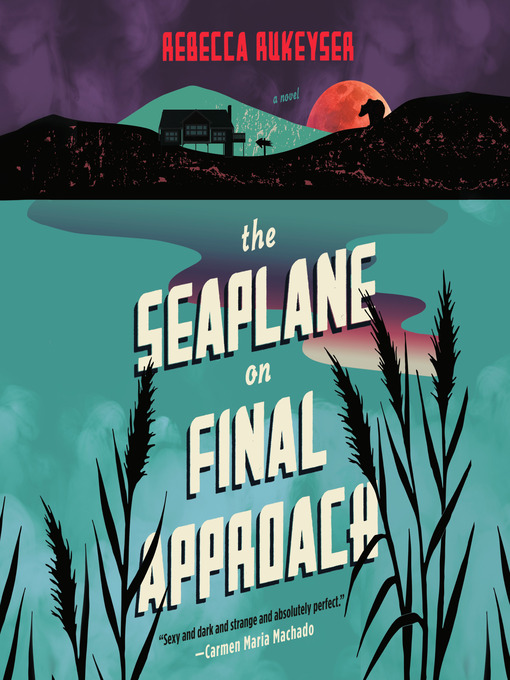Review by Booklist Review
In her debut novel, Rukeyser invents Lavender Island, a place off the coast of Kodiak Island, Alaska, that can only be reached by boat or seaplane, and where cars don't exist. Into this pristinely rugged, claustrophobic setting she drops Mira, a teenager exiled for the summer to work as a baker at the island's Wilderness Lodge. But what Mira's parents consider a sort of punishment for her own wildness she sees as freedom, a catalyst for even greater escape, preferably with the sleazy-sexy fisherman step-cousin she met a year ago and can't stop thinking about. Through the scrim of Mira's detachment, readers meet lodge owners Stu and Maureen, whose facade as long-married, happy homesteaders crumbles as the novel progresses and Stu's playful affection for Mira's coworker, a teenager herself, reveals itself as something else. Rukeyser's writing is spare and deliberate as, from a murky present, adult Mira looks back on this now-crystallized teenage summer with a kind of awe. Lodge guests came and went, weather threatened and broke, and things that once seemed impossible became not so--and vice versa.
From Booklist, Copyright (c) American Library Association. Used with permission.
Review by Publisher's Weekly Review
In Rukeyser's intoxicating debut, high school dropout Mira, 18, finds herself witness to a whirlwind of drama on a remote Alaskan island. Mira, obsessed with the concept of sleaziness, appreciates Alaska for "contain more sleaze than the entire lower forty-eight" after a trip the previous summer, during which she fell into unrequited lust over her aunt's seedy stepson, 24-year-old Ed. She returns and takes a job as a housekeeper and baker at Lavender Island Wilderness Lodge, with the goal of finding Ed and building a life with him. She's one of six employees on the island, including Maureen and Stu, the middle-aged married couple who own the business; 18-year-olds Polly and Erin; and a recovering alcoholic chef. When not masturbating to the fantasy of phoning Ed, she notices Stu taking an interest in Erin. Tensions in the group escalate, creating a sense of desperation that's heightened by the "deep, solemn fear" cast by the landscape. Mira, with her propensity for daydreaming and detachment, imagines intricate inner lives for her colleagues, a charming and fascinating element that takes this beyond the standard workplace drama. Rukeyser's signature bleak humor will leave readers excited to see what comes next. Agent: PJ Mark, Janklow & Nesbit Assoc. (June)
(c) Copyright PWxyz, LLC. All rights reserved
Review by Library Journal Review
Rukeyser's debut is a haunting coming-of-age narrative with a distinctive protagonist. Over the course of a pivotal summer in Alaska, teenage narrator Mira confronts adulthood, lust, and compulsion. Taking on a hospitality role at a seaside resort, she is thrown into a rugged new world of tourists, staff, and fishermen as she wrestles with daydreams, baked goods, trauma, and an unknown future. As this novel is told in the first person, listeners will spend much time inside Mira's head. She has a unique way of seeing the world and a fixation on taxonomy and sleaze, which is reflected in Rukeyser's poetic language. Jeremy Carlisle Parker's performance emphasizes Mira's teenage detachment from the world through flattened, monotone narration, but other characters are performed with more animation, which sometimes seems to reflect Mira's dislike of them. This can make for a jarring listening experience at times. VERDICT This is a powerful look at the bewildering world of young adulthood.--Halie Theoharides
(c) Copyright Library Journals LLC, a wholly owned subsidiary of Media Source, Inc. No redistribution permitted.
Review by Kirkus Book Review
Rukeyser's debut is a strange, dreamlike coming-of-age story set in coastal Alaska. Mira, the 18-year-old narrator, is, oddly, obsessed with the concept of "sleaze": defining it and identifying it. She spends a summer working as a baker at Lavender Island Wilderness Lodge, a homestead that functions as a sort of bed-and-breakfast for international tourists. She passes time fantasizing about her aunt's stepson, Ed, and observing the strange social dynamics that result from the eclectic coterie of personalities working at the homestead, which include a middle-aged married couple, two other teen girls, and a brooding addict. While she is obsessed with sleaze and with her imagined future with Ed, Mira is largely detached from her actual surroundings, participating mostly as an observer--until the drama among her colleagues becomes impossible to ignore. The detached perspective through which we experience this unfolding narrative adds to its rarified, dreamy quality. With a delicate touch, the story invites rumination on themes of obsession and fixation, the dichotomous beauty and eeriness of an isolated landscape, and the struggle of locating oneself within a new environment. It is a testament to the power and subtlety of Rukeyser's writing that the novel's violent climax, though preceded largely by a sense of quietude throughout, does not feel surprising or out of place; it is simply the result of the building social tensions and sense of desperation among the group and of a particular landscape whose compelling beauty--the author shows us--conceals dangerous potential. The obviously talented Rukeyser has crafted a vividly beautiful and odd world; the specificity of Lavender Island propels the story here as much as the characters and the plot, and that is thanks to her descriptive and imagistic prose. This darkly compelling novel promises more interesting writing to come from Rukeyser. Copyright (c) Kirkus Reviews, used with permission.
Copyright (c) Kirkus Reviews, used with permission.

